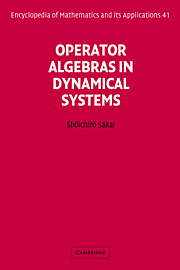3 - Unbounded derivations
Published online by Cambridge University Press: 27 March 2010
Summary
Introduction
In Chapter 2, we mainly discussed bounded derivations on C*-algebras and special unbounded derivations which arise from a fixed physical state (and consequently associated with a W*-dynamical system). However, in quantum physics, we have to study various physical states like ground states, vacuum states and equilibrium states on a C*-algebra of quasi-local observables. In addition a partial differentiation on a mainfold is not bounded. Therefore, unbounded derivations in C*-algebras are perhaps much more important than those previously discussed.
In the previous chapter, we have seen that an everywhere-defined derivation on a C*-algebra is automatically bounded; for such derivations, the purely algebraic property implies continuity. On the other hand, for a densely defined derivation, the purely algebraic property (Leibnitz's rule) does not imply closability. Therefore it is quite difficult to study densely defined derivations from a purely algebraic point of view. -Fortunately all densely defined derivations which arise from analysis, geometry and quantum physics turn out to be closable. They are also self-adjoint with respect to the *-operation. In this chapter, we shall study closable *-derivations in C*-algebras. The study of general unbounded derivations in C*-algebras can be divided into three steps: (i) closability, (2) the domain of a closed *-derivation and (3) generators.
Closable *-derivations are also of special interest, because they include partial differentiations in manifolds. In this chapter, we shall discuss these topics.
- Type
- Chapter
- Information
- Operator Algebras in Dynamical Systems , pp. 55 - 100Publisher: Cambridge University PressPrint publication year: 1991

